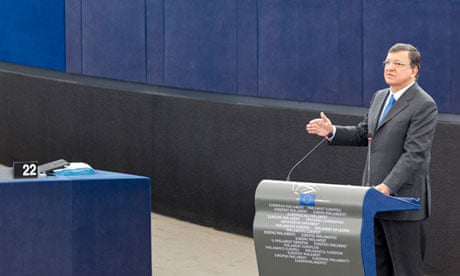Germany's political elite is relieved. The Karlsruhe court ruling on the constitutionality of the euro bailout fund unties chancellor Angela Merkel's hands in the longrunning effort to save the single currency.
But it also highlights the curbs on any German government's freedom to make policy, particularly on arguably the most pressing issue in Merkel's in-tray — what to do about Europe?
Merkel's mantra in recent weeks is that she wants "more Europe". Her Christian Democratic party has passed a motion calling for greater European integration. On Wednesday in his state of the union speech to the European parliament, José Manuel Barroso, president of the European commission, lined up behind Merkel for the first time with a radical rallying call.
"Let's not be afraid of the words. We will need to move towards a federation of nation states. This is what we need. This is our political horizon," he declared.
A new European federation with common fiscal, economic, and budget policies stripping national parliaments and governments of the most fundamental powers, a directly elected president of Europe with the main European political party groupings putting up candidates at the next European parliament elections in 2014 for Barroso's job — head of the European executive.
All of this effectively requires a new European constitution or at the very least a renegotiation of the Lisbon treaty, triggering referendums in some countries, including Britain and in all likelihood a UK exit from the EU.
It's not a new, but a nonetheless radical federalist blueprint re-energised by the EU's worst ever crisis, the euro meltdown. Much of this vision is not only shared but originates in Berlin.
But it would never get past the eight judges in Karlsruhe.
Is Merkel serious about her European "political union"?
"It might be a distraction from the immediate crisis, but yes, they're serious," said Katinka Barysch, a German economist at the Centre for European Reform. "You can still convince most Germans that more Europe is a good thing. And they're doing this out of political necessity, to show the public they're not panicking blindly because of market pressure."
The problem for the politicians is the constitutional court. "The Grundgesetz [basic law] is a constraint," added Barysch.
The proposals from Barroso on Wednesday and the kind of EU quantum leap being mulled in Berlin require vast transfers of sovereignty to EU institutions from national parliaments and governments.
Karlsruhe already set firm limits on this in its verdict on the Lisbon treaty a couple of years ago. Andreas Vosskuhle, the judge who read out Wednesday's verdict, has said previously that the scope for further European integration is already exhausted under the terms of Germany's constitution.
In short, Germany as well as the EU needs a new constitution for the Merkel-Barroso vision to be more than a mirage. And that means a referendum.
National referendums are banned in Germany because of the plebiscitary abuse performed during the Third Reich. The sole grounds for a referendum is to change the constitution. This is already shaping up to be a major issue on the assumption that Merkel wins a third term a year from now. If, as often predicted, she forms a "grand coalition" with the opposition social democrats, the two big pro-EU parties will have a thumping majority to push constitutional change.
"Everything will depend on what coalition she forms next year," said Ulrike Guerot of the European Council on Foreign Relations in Berlin.
"The pressure on the constitution has become so high that you cannot make the big game-shift."
All of this is treacherous political territory where Merkel has to perform two formidable and parallel tasks — persuade German public opinion, fed up with the euro crisis and revering the big independent institutions, the court in Karlsruhe and the Bundesbank in Frankfurt, that the Basic Law needs to be changed, while also coaxing the rest of the leaders of Europe into backing what Barroso is describing as a "new deal."
No French president has ever assented to the federalist plot. Will François Hollande be any different? While supporting German hawkishness on the euro crisis, the Dutch don't want to transfer any more powers to Brussels. Another Irish referendum could wreck the gameplan. No British government would take part.
At which point the Germans and Barroso will lower their sights and settle for a eurozone rather than a full EU federation. Berlin will tell Paris and everyone else that if they want to use German credit cards to guarantee or redeem their debt, the federation is the price they will have to pay.
Much of the eurozone is keen on pooling liability, but not on giving up sovereignty, Merkel is fond of complaining.
Hollande, if he is unable to turn around a weakening French economy, will face very tough choices.
"The really big German concern is about France," said Guerot. "That's the big debate, but it's a Venus-Mars discussion. Will France make the compromise needed for political union to get German money? Either the French jump or we all don't jump at all."











Comments (…)
Sign in or create your Guardian account to join the discussion